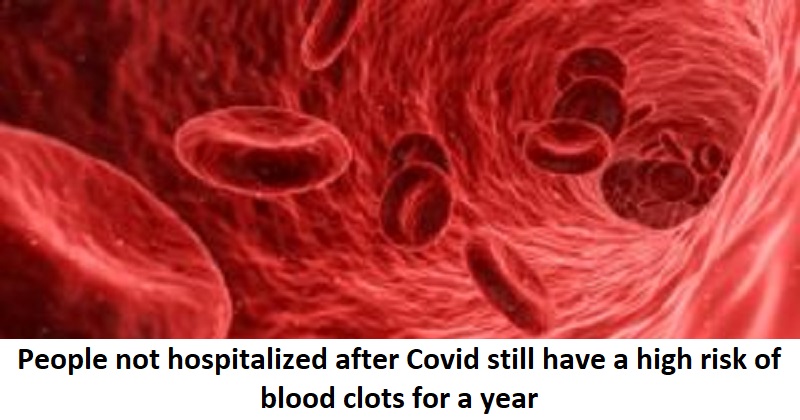
Researchers have cautioned that Covid-19 infection raises the risk of potentially fatal blood clots for at least 49 weeks, or almost a year, even in people who do not require hospitalisation. The results indicate that the pandemic may have contributed to an additional 10,500 cases of heart attacks, strokes, and other blood clot complications like deep vein thrombosis in England and Wales in the UK in 2020 alone, even though the additional risk to individuals is still minimal and gradually diminishes over time.
People with only mild or moderate conditions were also impacted by the study, which involved a sizable team of researchers led by the Universities of Bristol, Cambridge, and Edinburgh as well as Swansea University. According to the research of 48 million unvaccinated people from the first wave of the pandemic that was published in the journal Circulation, the authors speculate that preventative measures, such as providing high-risk patients medicine to control blood pressure, might help minimise the incidence of major clots.
‘We are reassured that the risk drops quite quickly — particularly for heart attacks and strokes — but the finding that it remains elevated for some time highlights the longer-term effects of Covid-19 that we are only beginning to understand’, said Jonathan Sterne, Professor of Medical Statistics and Epidemiology at the University of Bristol, who co-led the study.
People were 21 times more likely to get a heart attack or stroke in the first week following a Covid-19 diagnosis. These diseases are mostly brought on by blood clots obstructing arteries.
After four weeks, this became 3.9 times less common. Deep vein thrombosis and pulmonary embolism, a potentially lethal blood clot in the lungs, were two other disorders that the researchers looked at. In the first week following a Covid-19 diagnosis, the risk of blood clots in the veins increased 33 times more. Four weeks later, the danger rose to eight times greater.
The majority of the earlier studies examined how Covid affected blood coagulation in hospitalised patients. Although their additional risk was not as significant as for those who had severe sickness and were hospitalised, the present study demonstrates that there was also an effect on persons for whom Covid did not result in hospitalisation.
Also Read: Gurugram authorities ask offices to work from home amid rain alert
‘We have shown that even people who were not hospitalised faced a higher risk of blood clots in the first wave. While the risk to individuals remains small, the effect on the public’s health could be substantial and strategies to prevent vascular events will be important as we continue through the pandemic’, said Angela Wood, Professor of Biostatistics at the University of Cambridge.

Post Your Comments